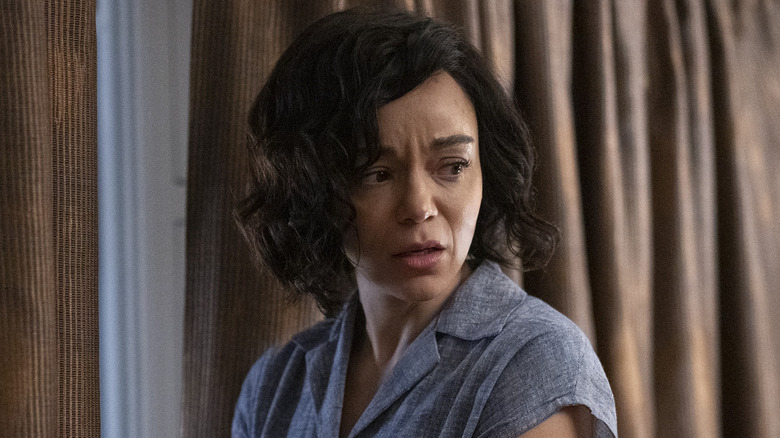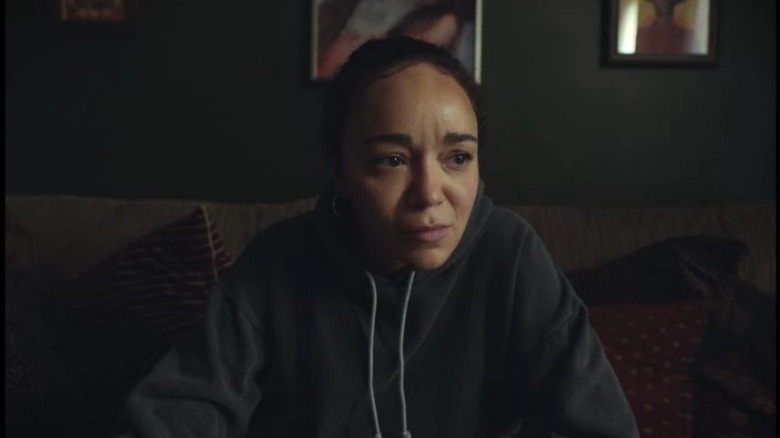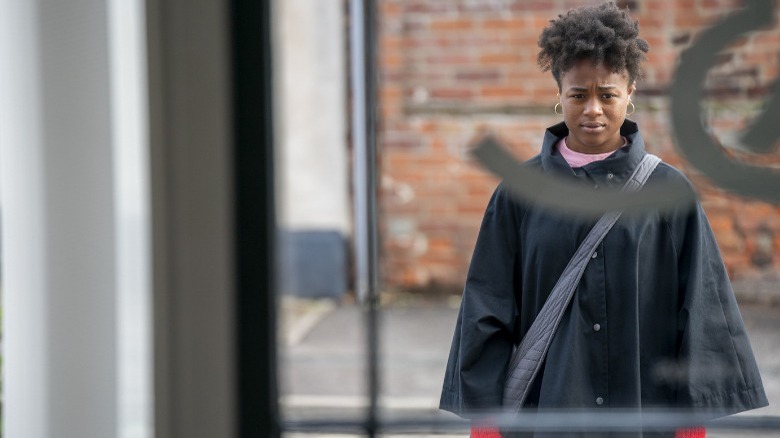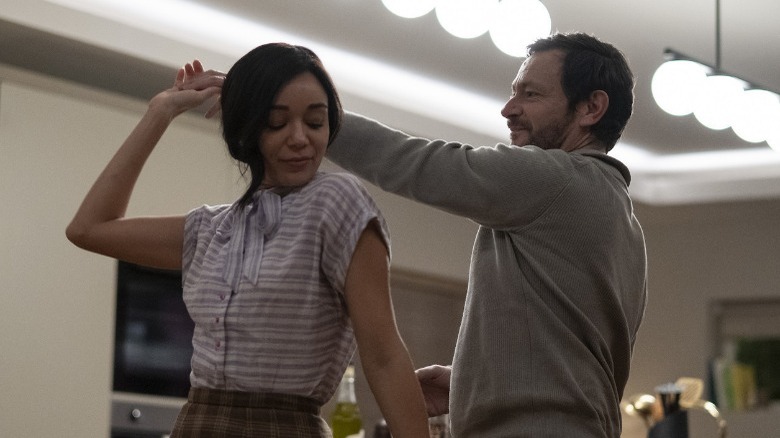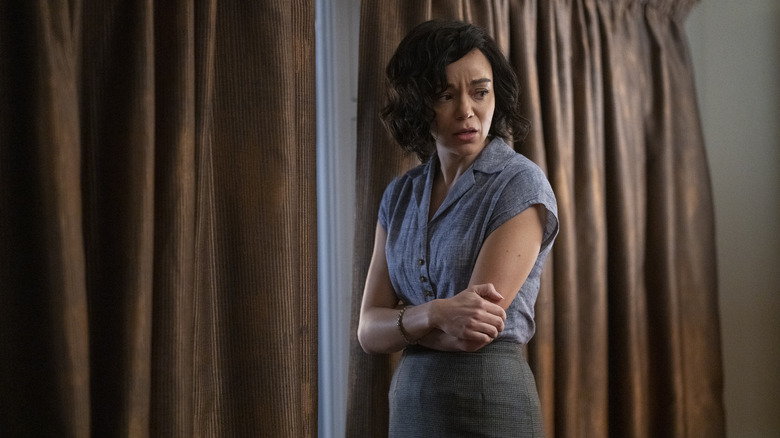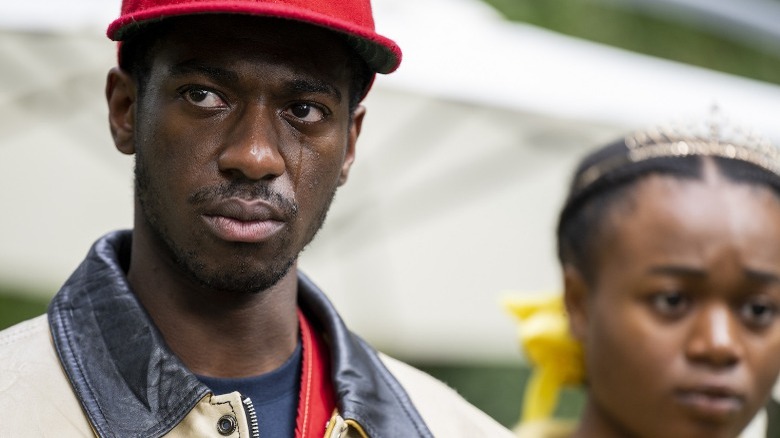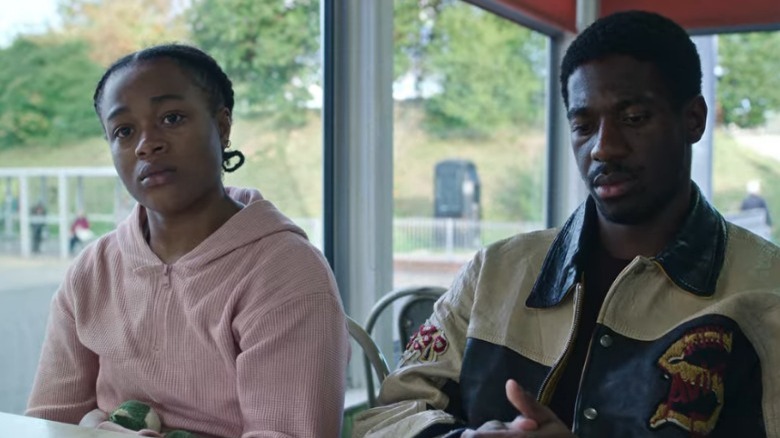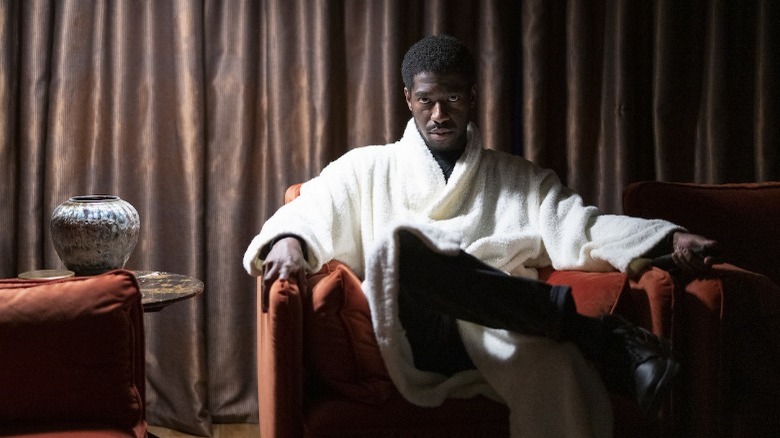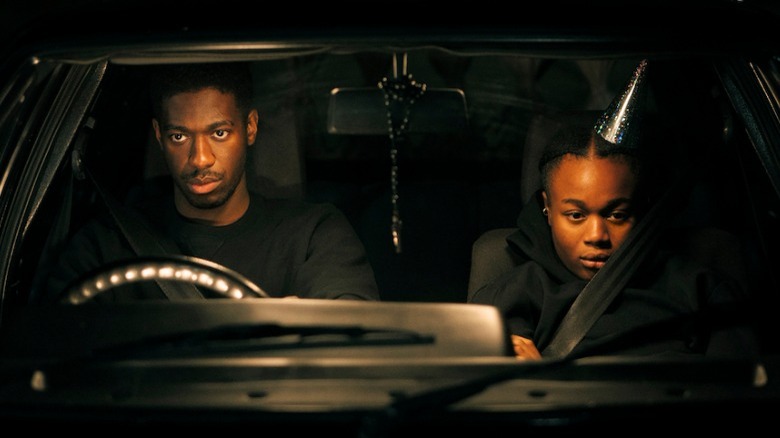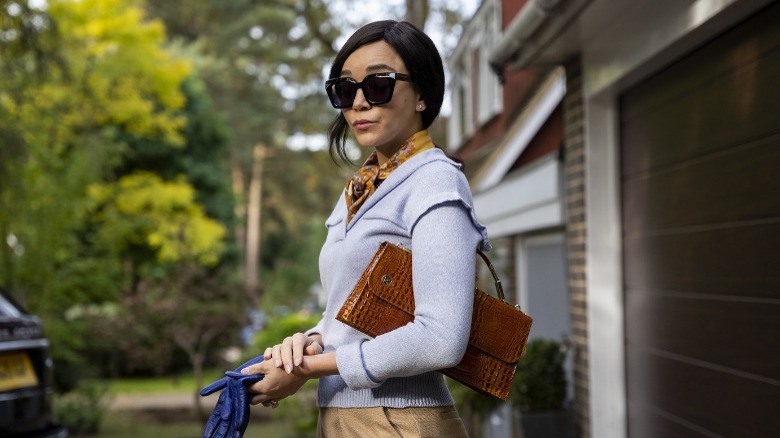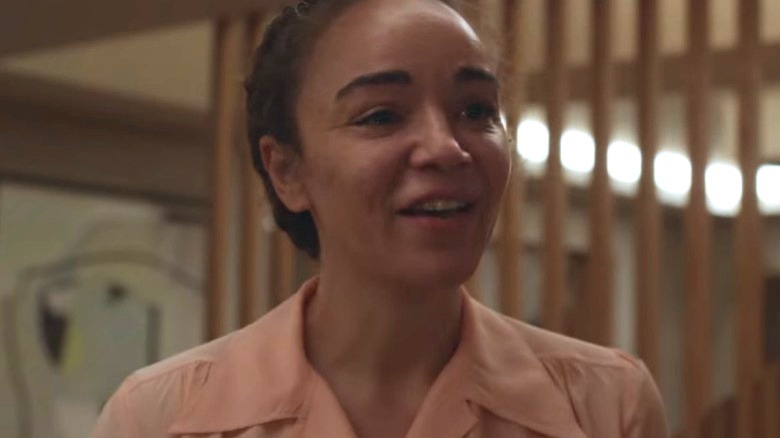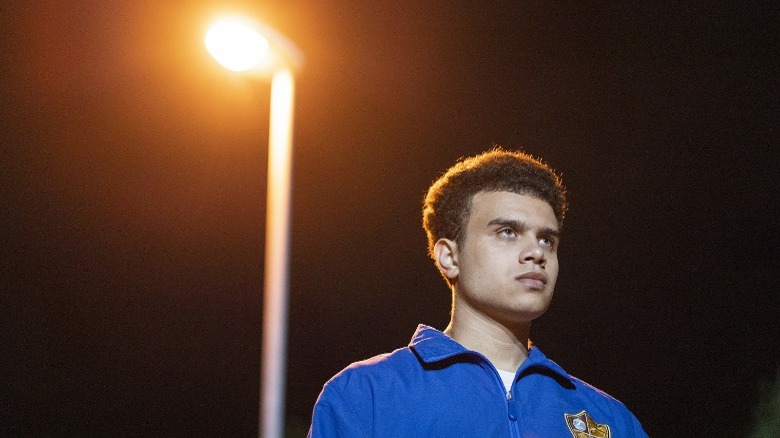The Ending Of The Strays Explained
Contains spoilers for "The Strays"
At a glance, "The Strays" may give viewers strong "Get Out" vibes. After all, both are psychological horror movies that begin with a Black character in a suburb where they don't feel safe. However, this psychological thriller on Netflix is compelling in its own right, focusing less on the horror of meeting your girlfriend's parents and more on the horror of a family reunion.
The ending of "The Strays" may be difficult to wrap your mind around. What starts out as a story about a mother being followed by two ominous specters evolves into an intense family reunion that ends in violence and betrayal. The movie doesn't give any easy answers, and it's difficult to tell who are the heroes and who are the villains. Viewers may be wondering what drives these characters to take such drastic measures, and what happens after the movie's abrupt ending. Also, what's with the party hat? We know you can't stop thinking about the party hat.
What's going on in the opening scene?
To understand the ending of "The Strays," we need to go back to the beginning. The cryptic opening scene sheds some light on the events that happen later in the movie.
The scene gives us a glimpse of a woman named Cheryl (Ashley Madekwe) before she changes her name to Neve and moves out of the city. She is talking on the phone with her sister, who is babysitting Cheryl's two young children. Cheryl is inconsolable because she is struggling to pay rent. Recounting how the people at the housing office treat her like dirt because of her race, Cheryl wonders why she can't ever seem to climb the social ladder, no matter how hard she works. "I want more," she says. "Is it wrong to want more?" This crucial conversation reveals a key detail about Cheryl's character: She believes she deserves a better life and is willing to do anything to attain it.
Cheryl begins packing her bags, clearly anxious that her husband Michael could come home at any minute. Observant viewers will notice a belt hanging on the bedroom door. This detail would seem innocent, except Cheryl's face and the movie's score show that it carries a lot of weight. Most likely, Michael has used it to beat her. The scene ends by showing the note Cheryl left on her refrigerator: "Just popped to the hairdresser's." As viewers soon learn, these are her only words to her children for eighteen years.
If you or someone you know is dealing with domestic abuse, you can call the National Domestic Violence Hotline at 1−800−799−7233. You can also find more information, resources, and support at their website.
Who are Carl and Dione?
Many years later, Cheryl (now calling herself Neve) lives in Castle Combe, a wealthy and predominantly white suburb. She has married a white man named Ian (Justin Salinger) and risen up the social ladder sending her children to a fancy private school. Despite this, an air of unease hovers over Neve's suburban home. Soon, Neve discovers she is being stalked by two mysterious figures: a teenage Black girl and a young Black man. At first, these two characters seem sinister, but they only seem this way because Neve is an unreliable narrator. The moment the film steps outside Neve's POV, viewers learn that these two "stalkers” are not what they seem.
The two characters are named Carl (Jorden Myrie) and Dione (Bukky Bakray), and they are Neve's children from her previous marriage. Neve abandoned them when she fled her abusive husband to pursue a better life. Not once has Neve reached out to her children, nor has she told her new family about her former life. Now Carl and Dione have found Neve, hoping to be loved or at least acknowledged by their mother. When that fails, they resort to something more drastic.
Their first bid for her attention involves sending Neve a package that contains a refrigerator magnet shaped like a racecar. This is the same magnet Neve used to pin her fateful message to the fridge, and it leaves her spooked.
Why didn't Neve take her kids with her?
Neve's decision to abandon her first two children (Carl and Dione) is the catalyst that sets the entire movie in motion, and her motivations are difficult to unpack.
One factor in her decision was simply that she would have been physically unable to care for two children. Being a single mother is hard, and it's much harder for a young Black woman who is deep in debt and trying to escape an abusive husband. She may also have known that she would be held to an unfair double standard unless she left in secret. No doubt Neve was conscious of the fact that society tends to be more judgmental toward women than men if they leave their children, simply because women are automatically expected to have "maternal instincts". When trying to defend her actions near the end of the movie, Neve declares, "I did what I had to do. What fathers do all the time." Her excuse gives viewers pause because there is a grain of truth to it; Neve is hardly the first parent to do this and get away with it.
Most of all, though, Neve wanted to escape her past. She felt entitled to a better future, though she apparently didn't wish the same for her kids. The day she left, Neve decided that her children were part of the life she needed to escape. Perhaps she feared that if she brought her kids with her, her problems would follow her.
Why does Neve wear a wig?
On the surface, this character quirk about Neve makes no sense. Neve has not just one wig but three, which she keeps in a special case behind frosted glass. Why does she insist on hiding her curly hair under a wig every time she leaves the house? Neve is paranoid that others will see what lies beneath her wig — she even adjusts it in the middle of having sex. And she isn't just concerned with her own hair: She is clearly disappointed after her daughter Mary (Maria Almeida) braids her hair into cornrows.
The reason Neve is so preoccupied with hair is that she associates it with her troubled past. She hopes that by concealing it she can forget the life she left behind. What's more, Neve is ashamed of her identity as a Black woman. She has been told all her life that she was worthless, and by now she has started to believe it. Ever since she left her kids, Neve has been convinced that only white people can have the kind of lifestyle she now enjoys. And since Neve is mostly white-passing, she covers up the only part of her body that she believes is a dead giveaway: her hair.
These fears are laid bare in the scene where Neve has a nightmare. In her dream, tendrils of hair come alive and wrap her arms in a strangling grip. As far as Neve is concerned, her hair is a monster she cannot escape.
Why do Carl and Dione respond to trauma differently?
Carl and Dione were both hurt by their mother, but they both respond to this betrayal in dramatically different ways. Carl is bitter and has resigned himself to the fate that he'll never belong in Neve's new family. Dione is more forgiving. She harbors no ill will toward Neve's new family and even wants to be friends with her stepsister Mary. Carl definitely shows empathy toward his stepbrother Sebastian (Samuel Paul Small), especially when he learns that Sebastian is an outcast. But as Carl's resentment toward Neve deepens, he seems to lose sympathy for Sebastian. Carl is willing to torment his stepbrother Sebastian with a cruel rite of passage on the rooftop, and during the film's climax, he humiliates the whole family, not just Neve. For a while, Dione seems to cling to the hope that her mom will welcome her with open arms. But after Dione sees her mother's reaction when she shows up at Neve's party, she is quickly dispossessed of that notion.
Most likely, the two siblings respond differently because Dione is too young to remember the abuse they endured from Neve's first husband, as well as whoever raised them after Neve left. Carl remembers, though, and the trauma has hardened him. This trauma sends him into a destructive spiral. He becomes so bent on revenge that he forgets that his sister just wants to celebrate her birthday with her step-siblings.
What pushes Carl and Dione to their breaking point?
Knowing what Neve has done, viewers can't really blame Carl and Dione for their actions. Neve has done a lot of shameful things to her children, but the final straw for Carl and Dione is when Neve meets with them to make things right. Neve's idea of this reconciliation involves offering some vague apologies, trying to justify her decision, and giving her kids £20,000 to compensate Carl and Dione for 18 years of not having a mother.
Not counting the fact that £20,000 wouldn't have been sufficient for the siblings to survive (whether they received it as kids or adults), this gesture is an immense insult. What Carl and Dione really wanted was acceptance from their mother and a proper home. They could care less about the money, especially since Neve seems to only be giving them this money to buy their silence. Yet Neve is blind to how they feel, because she assumes that her children are like her and care only about money and social standing.
The worst part is when Neve says she split the amount between two separate checks — "To avoid arguments," she explains. It shows just how out of touch she is with her children. Since Carl and Dione grew up without a mother and needed to rely on each other, it's outrageous to think these two siblings would fight about something as petty as how to split their money.
Why do the characters pretend to be a happy family during the break-in?
The ending of "The Strays" is a subversive approach to the genre of home invasion movies. There is hardly any violence shown on-screen, but the sequence is pregnant with tension. Whenever Carl and Dione break into Neve's home and begin intimidating her new family, they do it under the pretense of celebrating Dione's birthday. The two walk in like they own the place and begin acting out the charade of a happy family, threatening Neve and her family to play along. By the end, every member of the family joins in on the fake "family game night."
Essentially, all the characters are "playing house." For Carl and Dione, this is a way of reclaiming their lost childhood and all the family game nights they never got to have. Of course, it becomes increasingly clear as the night unfolds that this is no substitute for the real thing.
At the same time, they are making a mockery of the lifestyle that Neve abandoned them to pursue. The way that Carl and Dione pop toast in the toaster, don fancy bathrobes, and order takeout is all a performance intended to provoke Neve. In a sense, their staged family gathering is no more real than the illusion that Neve was living in suburbia before Carl and Dione showed up. By pretending to be a fake family, the two siblings are exposing the pervasive fakeness in Neve's life.
Why is Dione wearing a party hat?
One of the most jarring images in the entire movie is what Dione chooses to wear during the break-in: a silver party hat. She is smiling throughout the entire sequence and even laughs out loud when she plays Scrabble. When her step-family sings her "Happy Birthday" (under the threat of physical harm), Dione closes her eyes and soaks it in.
Carl seems to only care about humiliating Neve and her new family, but Dione seems to genuinely see the break-in as a chance to celebrate her birthday with her new family. She happily buys into the charade. The most likely reason she acts this way is that she is still a child at heart. After all, she still carries a stuffed animal. Dione is not naive, not by a long shot. The confrontation at the party has disillusioned her and destroyed any last hope of her mother accepting her. Still, she figures that if she's going to get revenge on Neve, she might as well enjoy herself. For Dione, the break-in is a chance to become a kid again, even though she knows that it's only pretend. She wants to believe that things will be alright.
Although Dione's behavior is not as destructive as Carl's, it's still not the healthiest way for her to deal with her childhood trauma. In this respect, she takes after her mother — she would rather live a lie than face the truth.
Who is the real antagonist?
At a glance, Carl seems to be the villain of the story. After all, he is terrifying when he breaks into Neve's home. Sure, he helps Sebastian stand up to bullies, but Carl proves to be a bit of a bully himself when interacting with Sebastian and the rest of the family. And let's not forget that Carl has blood on his hands. Still, for most of the movie, Carl is a sympathetic character. It is only in the final 20 minutes of the film, when Carl takes things too far, that he tips into possible villain territory. Even then, however, Carl is not the film's true antagonist. If there is any real villain here, it's Neve, who is responsible for pushing Carl to the brink.
At first, Neve was certainly a victim. She was denied help with housing, and later her neighbor gave her a condescending, inherently racist speech. Yet, as Neve rises in social status, she begins shifting from victim to oppressor. For instance, she is guilty of colorism when she pushes to fire Carl simply because she doesn't want a Black man near her son. Most importantly, though, Neve betrays her family — both her old family and her new one — because she cares more about her reputation.
Director Nathaniel Matrello-White confirmed in an interview with Digital Spy that he never intended Neve to be likable, saying, "I was really excited about having a really divisive, controversial protagonist."
Why does Neve answer the door?
Near the beginning of the break-in, Carl orders food from Uber Eats so he and his prisoners can eat dinner "like a family." Viewers may have completely forgotten about this plot point until the Uber delivery guy rings the doorbell. Knowing that Carl isn't watching but could walk in at any moment, Neve stands and answers the door.
It's possible that Neve is hoping to be rescued. After all, she could tell the Uber guy to send for help, even though if she gets caught, Carl might turn his wrath on her children. However, it's more likely that rescue is not even on Neve's mind, at least not at first. Perhaps it's simply force of habit that makes her answer the door, because it was part of her routine as a suburban housewife. Perhaps Neve wants to maintain the facade of a perfect family, even as that household is falling apart around her. She certainly seems to care more about giving the delivery guy a generous tip than trying to signal to him that she is in a hostage situation. She even tries to draw attention away from the cries of pain from her husband, whom Carl is torturing in the gym as she speaks. This is a damning moment for Neve, because it proves that she cares more about appearances than her family.
What happens to Neve and her family in the ending?
The ending of "The Strays" strongly implies that Neve has bailed on her family yet again — and this time she has abandoned her new family, too. Audiences hear the revving of the delivery guy's motorcycle, and judging by the faces of the other characters, Neve has hitched a ride with the Uber guy and fled. It's unlikely that she told the delivery guy what was happening. It would've been difficult to explain her situation without admitting her partial culpability. Instead, Neve probably just bribed him to give her a ride. By making a decision that mirrors the one she made in the movie's opening scene, Neve has come full circle.
We can only hope that the family Neve left behind can find support in one another. The final shot (all four of Neve's children standing in the doorway, realizing that their mother isn't coming back) certainly suggests that these step-siblings are going to bond over their shared abandonment. Perhaps Carl will realize too late that he was punishing the wrong person. Perhaps he will realize that he was too busy taking out his anger on Ian (who never knew about Carl and Dione and made repeated efforts to welcome them into his family) that he allowed the person who really hurt him to get away. However, knowing that Carl is still bitter with resentment and is responsible for Ian's (presumed) death, there's no guarantee that Carl, Dione, Mary, and Sebastian will forgive each other.
